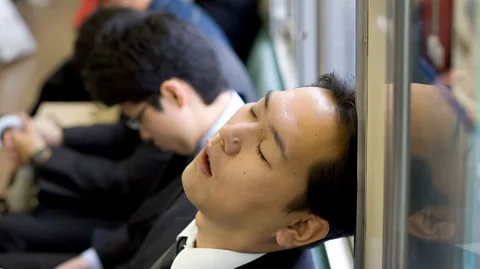Extreme exhaustion and burnout: How it happens and what to do about it
 Getty Images
Getty ImagesFeelings of fatigue are worryingly common, and in some cases, burnout can be extremely debilitating. So what might we do to treat this malaise?
More than a third of adults report feeling fatigue most or all of the time, while diagnoses of burnout are at an all-time high. What is leading us to feel so exhausted? And how can we develop greater resilience?
To find out, science writer David Robson spoke to Anna Katharina Schaffner, a cultural historian and executive coach specialising in burnout. Her new book, Exhausted: An A-Z for the Weary, examines the history and science of exhaustion, and offers evidence-based advice to cope with the stresses that life throws at us.
What's the difference between exhaustion and burnout?
Our anxieties around energy – and over-expending our reserves – are timeless. There's a lot of evidence that people have worried about exhaustion, and its causes, all the way back to ancient China.
Burnout, in contrast, is a syndrome with very specific symptoms. It is defined as an occupational malaise that manifests in reduced energy and efficacy, combined with "depersonalisation", which means a more cynical attitude towards the people with whom we work or the organisations for which we work.
If exhaustion is a spectrum, then burnout is at the sharp end of the spectrum. It's a very serious condition. Some people with burnout can feel completely incapacitated. Their bodies are saying no and stop functioning. They often have to change profession and it can take years to recover.
Why is burnout becoming more common?
There are lots of studies showing that burnout is on the increase across the world, in many different domains of work. I think that is partly because we are struggling with a more precarious and competitive working culture. It's also because we tend to overvalue work; it features centrally in our emotional universe. We expect so much of work these days: not just status and an income, but legitimisation. We want it to provide a sense of purpose and an opportunity for self-realisation.
 Getty Images
Getty ImagesIn the past, the boundaries between work and leisure were more clearly drawn, but now, with modern technology we're always connected. Unless we are highly disciplined, we find it very hard to switch off from work and not to check emails or Slack messages. This means that our thoughts revolve around work all the time.
What are the leading triggers for burnout?
Research shows that the top six reasons for burnout are excessive workloads, insufficient autonomy, inadequate rewards, breakdown of community, mismatch of values, and unfairness.
The unfairness factor is probably the most important one that I encounter with my clients. A lack of appreciation can cause incredible social pain. Some studies show that a lack of appreciation can double our risk of burning out. This is depressing, because it's so easy to give, yet a lot of managers are terrible at making people feel appreciated.
How do our personal thinking patterns exacerbate the stresses we fear?
There is a proven correlation between perfectionism and burnout. If we have unrealistically high expectations of what we feel we should achieve, and if we judge our work very harshly, then we are much more likely to burnout. Many people have an "inner critic": a strongly negative internal voice. It's as though someone is constantly shouting negative remarks at us, and that can drain our energy from the inside.
What kind of evidence-based strategies can help people to deal with feelings of exhaustion and burnout?
The first step to overcoming exhaustion is to understand our preferences, so that we can be wise and mindful about how much time we spent outside of our comfort zone and know when we should return for recovery. We also need to understand our core stressors, and to identify which of those are in our control and which of those are not in our control.
In my work as a coach, I also use the principles of Acceptance and Commitment Therapy (ACT). The acceptance component is the idea that it's normal to have "negative" thoughts and feelings such as fear, anger, and sadness, and you don't necessarily have to fight them in the moment. With other forms of therapy, you might try to build up evidence to prove your inner critic is wrong, but it can cost a lot of cognitive energy to try to reason and rationalise with these states of mind. Using ACT we instead try to "de-fuse" from those negative thoughts and emotions, by taking the stance of an objective observer. Rather than saying, "I'm really angry about x, y and z" you might say "I note that I am experiencing anger" – and that simple shift in perspective gives us a sense of distance, alongside more control and power.
 Getty Images
Getty ImagesIt's a very powerful technique for people who are their own worst critics. If you find yourself thinking repeatedly that you are bad at your job, unattractive, or unlovable, you can consciously note that this is your inner critic speaking, without getting too caught up in the thoughts or taking the criticisms too seriously.
We can think of our brain as similar to a sushi conveyor belt: it presents a constant stream of dishes that travel past us. Some of them look attractive and some do not. We do not have to pick every single one up and eat it. The acceptance part in ACT is to learn to let the less nourishing dishes float past us without engaging.
In your career as a cultural historian, you've also examined the history of self-help. What ancient techniques can people use to complement the principles of ACT?
We can use ancient Stoic philosophy to manage our expectations. There's a beautiful phrase from Marcus Aurelius that says "Only a madman goes out to look for figs in winter". It captures the idea that a lot of us have very unrealistic expectations of life in general and also of our inner life. If our expectations are wrong we can only get disappointed. We seek, for example, to cherry-pick the good emotions, and get rid of the ones that we don't particularly like, so that we can be happy all the time. This isn't helpful, because our feelings will naturally fluctuate.
You may also like:
What is more, our heightened expectations can create a lot of shame and guilt about experiencing negative emotions. In ACT this is called "dirty pain": we don't just experience anger or sadness, but we add to it an additional layer of suffering.
The same goes for our feelings of energy: there will be days or months when our energy levels are higher, and then there will be times when our energy levels will be lower. And taking a more Stoic approach to those fluctuations can prevent us from adding a further mental burden.
You mentioned earlier that work has taken too central a role in our lives. What can we do to disengage?
When we're completely entangled in our work, and our identity has become enmeshed with it, it can indeed be very scary to stop and even just contemplate doing something else. Because the more of our time and energy we dedicate to work, the emptier the other domains of our lives become. It's only when we stop working and look around that we see all these empty "rooms". It's very important gradually to build up other sources of meaning and joy and pleasure in our lives, so that work is not all we have
A good idea can be to take a hobby. They should be "non-instrumental activities" that are completely free from a competitive ethos or drive for enhanced productivity. The idea is to take off that pressure for achievement. A hobby's sole purpose should be to give us pleasure and allow ourselves to experience peace of mind by engaging in a joyous activity that doesn't take us anywhere.
Anna Katharina Schaffner's book Exhausted: An A-Z for the Weary is published on 18 January 2024 by Profile.
*David Robson is a science writer and author of The Expectation Effect: How Your Mindset Can Transform Your Life, published by Canongate (UK) and Henry Holt (USA). He is @d_a_robson on Twitter, and @davidarobson on Instagram and Threads.
--
If you liked this story, sign up for The Essential List newsletter – a handpicked selection of features, videos and can't-miss news delivered to your inbox every Friday.
